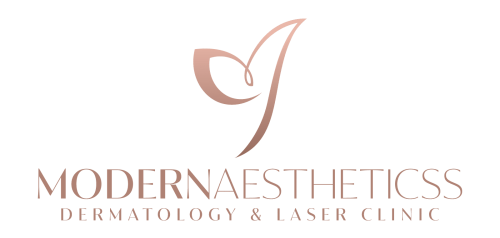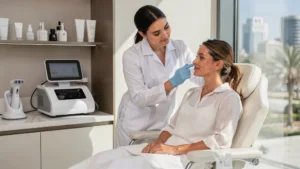Rosacea is a chronic and multifactorial skin condition that causes persistent redness, visible blood vessels, and sometimes acne-like bumps on the face. If you’re struggling with rosacea redness, you’re not alone—millions of people experience this condition worldwide. Understanding the causes and triggers is key to managing flare-ups effectively.
What is Rosacea?
Rosacea-prone skin is often sensitive and easily irritated. The condition can range from mild to severe and affect multiple areas of the face including the cheeks, forehead, chin, nose, and even the eyes—a form known as ocular rosacea. Early identification and control are crucial to prevent the condition from progressing.
As rosacea advances, it can appear in different stages:
- Stage 1: Mild redness triggered by external factors.
- Stage 2: Appearance of telangiectasias (visible broken capillaries).
- Stage 3: Persistent redness with papules and pustules.
- Stage 4: Thickened, orange-peel-like skin, often around the nose (rhinophyma).
- Stage 5: Ocular rosacea affecting the eyes.
Common Rosacea Triggers
- Sun Exposure – UV rays can intensify redness and inflammation.
- Hot Beverages & Spicy Foods – Heat causes blood vessels to dilate, worsening facial redness.
- Alcohol & Caffeine – Both can trigger flushing.
- Stress & Anxiety – Emotional stress is a common flare-up factor.
- Extreme Temperatures – Both heat and cold can irritate the skin.
- Harsh Skincare Products – Products containing alcohol, fragrances, or strong chemicals can aggravate rosacea.
How to Control Rosacea
Rosacea can be managed effectively, even though it cannot be cured, by combining:
- Lifestyle Modifications
- Medical Prescriptions
- In-Clinic Treatments
Best Rosacea Treatments
Medical Treatments
Modern therapies can significantly reduce rosacea symptoms:
- Prescription creams & oral antibiotics
- IPL (Intense Pulsed Light) – Highly effective for reducing redness and visible blood vessels.
- Laser therapies – Target deeper vascular issues for long-term improvement.
- Mild peels – Can help with texture and inflammation in selected cases.
Hydrafacial for Rosacea
At Modern Aestheticss in Dubai, we provide Hydrafacial treatments tailored for rosacea-prone skin. These are gentle and soothing, helping to reduce inflammation and improve skin texture.
Zein Obagi Enzyme Facial for Rosacea
Zein Obagi Enzyme Facial is ideal for sensitive skin and especially beneficial for those suffering from rosacea. It calms, hydrates, and rejuvenates without irritation.
Lifestyle Adjustments
Daily habits make a big difference. Use gentle skincare products, apply sunscreen regularly, and avoid known triggers to maintain skin health and reduce flare-ups.
Rosacea vs. Acne: Know the Difference
Although often confused, rosacea and acne are different. Rosacea typically involves facial redness, visible vessels, and sensitivity without blackheads. Acne, in contrast, includes blackheads, whiteheads, and clogged pores without the persistent flushing seen in rosacea.
Best Rosacea Treatment in Dubai
Looking for rosacea treatment near me? Modern Aestheticss, a top Dermatology & Aesthetic Clinic in Dubai, offers expert diagnosis and personalized rosacea treatments. Whether you’re dealing with mild redness or more advanced symptoms, our team can help you achieve clearer, healthier skin.
Book your consultation today and take the first step towards calming your rosacea and restoring your skin confidence!
Frequently Asked Questions
The time it takes for rosacea to improve depends on the severity of the condition and the treatment used. With proper treatment (like prescribed creams, oral antibiotics, or in-clinic treatments), you may start noticing improvement within a few weeks. However, significant changes may take a few months, especially if using long-term therapies such as laser treatments or IPL.
Rosacea is a chronic condition, meaning it typically lasts for life. However, with proper management, you can control flare-ups and reduce symptoms. The frequency and severity of flare-ups vary from person to person. Some people experience periods of remission, where symptoms improve or disappear for months or even years.
Some rosacea sufferers may experience oily skin, especially in the T-zone. This is more common in those with papulopustular rosacea, which resembles acne with pimples or pustules.
Research suggests that rosacea can run in families. Genetics may play a role in making some people more prone to developing rosacea.
Also Read
Popular Tags:
Rosacea treatment |Rosacea symptoms | Rosacea causes | Rosacea triggers | Skin redness






